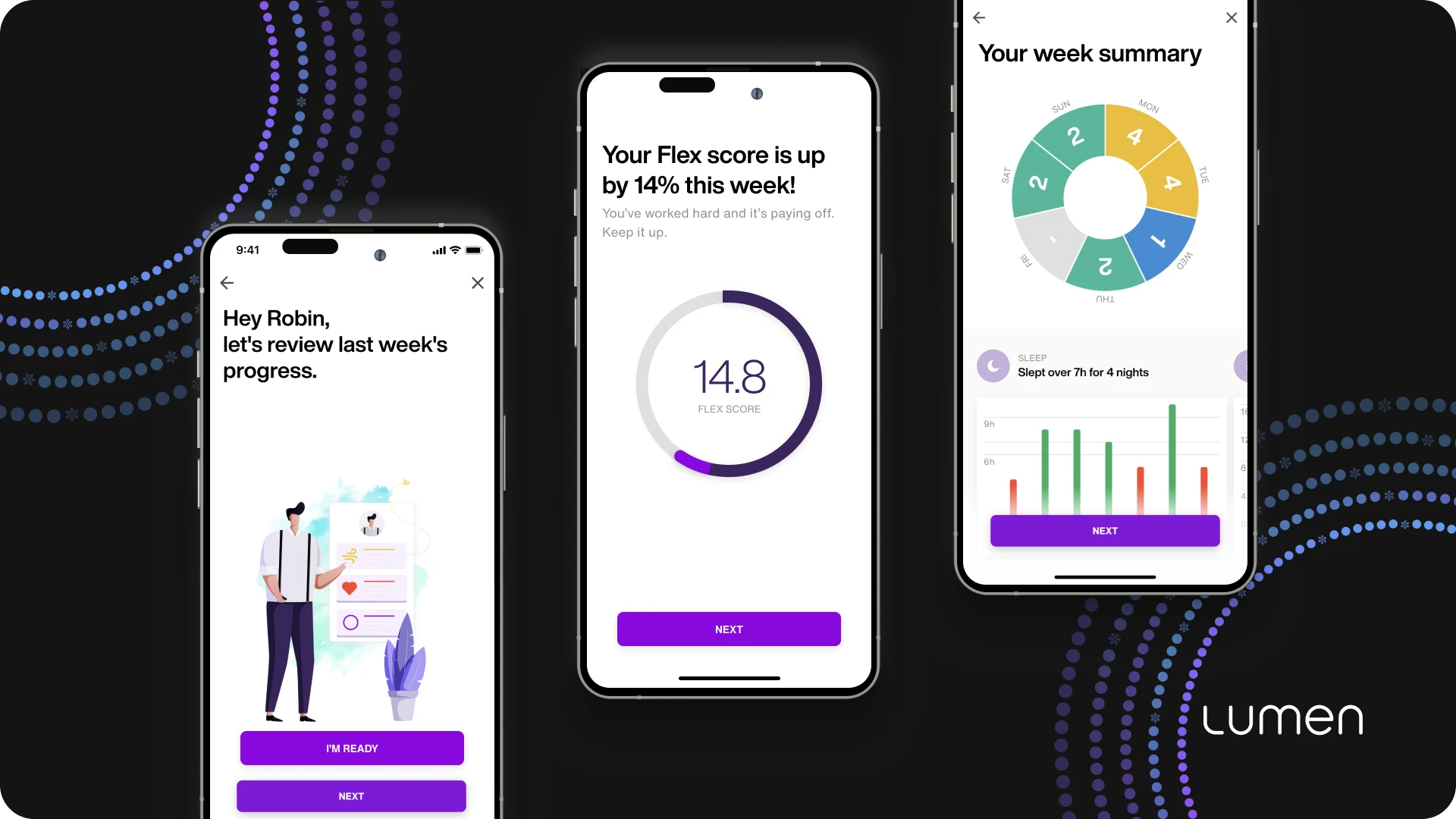Achieving a metabolically healthy New Year


Setting healthy New Year's resolutions that are both motivating and attainable is crucial for lasting success.
A recent survey emphasizes the trend that the most favored resolutions are health-oriented. These resolutions vary across age groups, with younger individuals typically focusing on mental health and fitness, whereas older individuals might prioritize weight loss, diet improvements, and overall fitness.
These trends highlight a growing awareness of the interconnectedness of lifestyle choices with overall metabolic health, a crucial yet often overlooked component of well-being (1).
Interestingly, while many of us have multiple health goals, there's a common tendency to believe that achieving all of them is unrealistic, leading to a narrowed focus on just one area. However, this perspective overlooks the powerful impact of enhancing metabolic health. By prioritizing our metabolic health, we can simultaneously target various goals and commit to our healthy New Year’s resolutions.
In this article, we'll shift the focus from isolated health targets to a more holistic view, emphasizing how our diet, exercise, and lifestyle choices influence our metabolic health.
With insights from Lumen's metabolic experts and coaches, we'll guide you through practical, science-backed strategies to cultivate habits that not only contribute to your immediate goals but also fortify your long-term metabolic well-being.
So whether you're aiming to shed weight, enhance your fitness routine, or simply feel more energized, understanding the metabolic nuances of your choices is key.
Let's dive into how you can align your New Year’s resolutions with metabolic health principles, ensuring that your efforts lead to sustainable and rewarding outcomes.
Metabolic health is a complex and comprehensive measure of your overall well-being, encompassing several key factors that indicate how effectively your body processes and utilizes energy.
Achieving and maintaining metabolic health is crucial as it can reduce the risk of chronic illnesses such as type 2 diabetes, heart disease, and stroke.
Regular physical activity, balanced nutrition, stress reduction, and quality sleep can enhance insulin sensitivity, mitochondrial function, and reduce inflammation, thereby improving metabolic health.
To prioritize metabolic health, consider incorporating the following practices into your lifestyle:
Our bodies are complex systems that require a balanced mix of nutrients to function optimally, much like a well-tuned engine needs the right fuel. In today's world, where processed foods are readily available, healthy nutrition choices can be challenging. A focused approach like a new year diet or dietary resolutions can be beneficial. It's here that tools like Lumen offer a personalized approach to nutrition. Understanding and adapting to your unique metabolic needs, Lumen becomes a pocket coach to help you align with a New Year's resolution diet.
With Lumen's metabolic insights, you gain a deeper understanding of how your body responds to different foods and macronutrients. Lumen's advanced algorithm analyzes your metabolic data, including your resting metabolic rate, carbohydrate sensitivity, and macronutrient utilization, to generate personalized meal plans tailored to your unique needs.
Our daily meal plans are an integral part of maintaining your dietary resolution. They provide straightforward guidelines, enabling you to make food choices that align with your metabolic profile. Moreover, for those who have chosen a new year diet, our macro tracking feature will help you monitor your nutrient intake, ensuring you remain accountable and attuned to your journey toward improved metabolic health.
While calorie counting has long been a popular approach to weight management, recent research suggests that focusing on macronutrients—carbohydrates, proteins, and fats—may be a more effective strategy for long-term metabolic health. Lumen's personalized nutrition plans prioritize the optimal balance of macronutrients for your individual needs, ensuring that your body receives the right fuel to function optimally.
In addition to the types of foods you choose, the timing of your meals and snacks can also play a significant role in metabolic health.
Lumen's flexibility lets you incorporate popular dietary strategies like carb cycling and fasting meal plans into your New Year diet.
Carb cycling involves strategically varying your carbohydrate intake throughout the week. This cyclical approach can help you optimize your metabolism, boost energy levels, and support weight management goals. Lumen's Carb Cycling Daily Meal Plan provides low-carb and boost-day nutrition plans, ensuring your carbohydrate intake aligns with your metabolic needs and activity levels.
Intermittent fasting (IF) involves alternating periods of eating and fasting. Various IF protocols exist, each with its own unique fasting and eating windows. Lumen's IF features enable you to determine the optimal IF protocol for your metabolism. By tracking your metabolic measurements, Lumen can help you identify the optimal fasting windows that align with your body's natural rhythm and maximize the benefits of IF.
Both approaches can be effective for boosting metabolism and achieving weight loss goals, and Lumen's insights can help you optimize these strategies for your individual needs.
In addition to a healthy diet, regular physical activity is crucial for achieving and maintaining optimal metabolic health and overall well-being. Exercise not only strengthens your muscles and improves physical fitness but also plays a vital role in managing stress, boosting mood, and reducing the risk of chronic diseases.
Lumen's pre- and post-workout measurements provide valuable insights into how your body responds to exercise, helping you optimize your workout performance and achieve your fitness goals. Additionally, by tracking your heart rate variability with a wearable, you can determine your optimal fitness zone and ensure that your workouts are challenging enough to drive positive changes while staying within your recovery limits.
To effectively incorporate regular physical activity into your lifestyle, consider these tips:
Sleep and mental well-being are crucial pillars of a healthy lifestyle, playing a significant role in maintaining optimal metabolic health. Just as diet and exercise contribute to our overall well-being, adequate sleep and a sound mind are essential for proper bodily functions and the prevention of chronic diseases.
The connection between nutrition and many of the top health concerns in today’s world is well-known. As it turns out, your food choices, meal timing, and nutrient balance also affect how well you sleep.
Our bodies operate on a natural 24-hour cycle known as the circadian rhythm, which regulates our sleep-wake patterns. Disruptions to our circadian rhythm can significantly impact sleep quality and, consequently, metabolic health. Lumen's before-bedtime and morning measurements provide valuable biofeedback on your circadian rhythm, helping you identify and address any imbalances that may be affecting your sleep.
Furthermore, nutrition plays a vital role in promoting good sleep. A balanced diet rich in whole foods and lean protein can help regulate sleep patterns and improve overall sleep quality. Lumen's personalized nutrition plans take your sleep schedule and preferences into account, ensuring that you're not eating too late and making dietary choices that support restful sleep.
Although it's generally not advised to eat right before bedtime, sometimes your daily eating schedule might go off track. If you find yourself needing a snack, choose something light and easy to digest. Eating a large meal can disrupt your sleep. Opt for foods that help boost melatonin and serotonin levels, soothing the body and setting the stage for restful sleep.
Foods rich in magnesium, like almonds, walnuts, pistachios, pumpkin seeds, and sunflower seeds, are great choices. Magnesium is known for its ability to foster relaxation and improve sleep quality.
Stress is a natural response to challenging situations, but prolonged or chronic stress can have detrimental effects on both physical and mental health. When we experience stress, our bodies release hormones such as cortisol, leading to increased blood sugar levels, weight gain, and impaired immune function. Chronic stress can also disrupt sleep patterns, further exacerbating these metabolic problems.
Stress management comes in many different forms and one size does not fit all. If you’ve tried one technique before and it didn’t work, try something else. Below are a few stress management techniques to consider to help you take the edge off and enjoy a more relaxed life.
Monitoring your progress is essential for staying motivated and adjusting your nutrition plan. Lumen's tracking features allow you to monitor your weight, body composition, and metabolic health markers. By tracking your performance, you can identify trends and celebrate your achievements, further fueling your commitment to a healthier lifestyle.

Nutrition, exercise, sleep, and stress management are all essential components for a balanced, healthy lifestyle but it can seem like a lot trying to add it all in. This is where we need to develop a flexible, sustainable routine for maintaining these changes.
Everyone is different in where they choose to set their goals. Some may struggle with diet and exercise but do well with sleep and stress management while others may struggle with only exercise or you may struggle with all of these.
Choose 1-2 areas to focus on. Setting your sights on where you wish to be but not focusing only on your end goals. For example, you can focus on setting small goals with your diet, such as the ones mentioned above while also prioritizing a consistent bedtime. If at any point you begin to feel overwhelmed, it’s time to take it down a notch. Don’t give up, simply cut back until you feel confident moving forward again.
If you plan to work on multiple areas of your life to find balance, consider using tools to help you track your progress and make your goals come to life. This could include tracking your meals, exercise, sleep, and your stress. Tracking can help to keep you accountable and also provides a visual of your progress which can help you feel motivated to keep moving forward this New Year.
By prioritizing metabolic health alongside your general well-being goals, you can set yourself up for long-term success. Embrace the journey, celebrate your achievements along the way, and remember that every step, no matter how small, contributes to your overall health and well-being.
Health is not only about diet. It’s also about lifestyle, which includes exercise, sleep, and stress management. All of these things work together to create a holistic approach to health.
Creating a healthy lifestyle takes time and dedication, which can feel easily overwhelming to many, leading us to ditch our New Year’s resolutions far too soon but don’t let those dreams go just yet. Instead, try something new. Try setting smaller goals and nurturing small changes that lead to big results.
Embrace and sustain healthy lifestyle changes far beyond the New Year. Use tools, such as Lumen, to help you get the most out of your health journey without all the unknowns.

Marine is a registered dietitian (RD) with extensive experience in clinical nutrition and a deep passion for well-being, health, and metabolism. With her background as a clinical dietitian and private practice owner, Marine has helped patients from diverse backgrounds improve their health through personalized nutrition. Currently, Marine serves as a customer success nutritionist at Lumen, where she provides expert nutrition support to clinics using Lumen’s technology to enhance their clients’ metabolic health. Marine is dedicated to empowering individuals to improve their relationship with food and achieve their health goals.